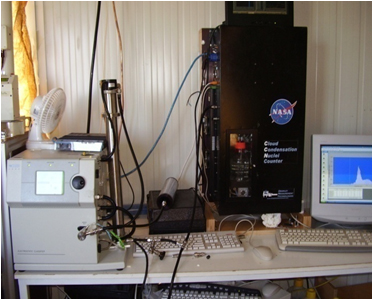CCN counter
Cloud condensation nuclei (CCN) counter is a instrument that provides in situ measurements of CCN. Its design constitutes a cylindrical continuous-flow thermal-gradient diffusion chamber employing a novel technique of generating a supersaturation: by establishing a constant streamwise temperature gradient so that the difference in water vapor and thermal diffusivity yield a quasi-uniform centerline supersaturation. This design maximizes the growth rate of activated droplets, thereby enhancing the performance of the instrument. The temperature gradient and the flow through the column control the supersaturation and may be modified to retrieve CCN spectra. Measurements of those particles that can become cloud droplets (or cloud condensation nuclei, CCN) are essential for providing a quantitative link between cloud microphysics and the physicochemical properties of aerosol. Observations are typically represented as number of CCN as a function of water vapor supersaturation (otherwise known as supersaturation spectrum). This is done because each CCN particle requires a minimum water vapor supersaturation, or critical supersaturation to convert into a cloud droplet.
A Continuous-Flow Streamwise Thermal-Gradient CCN. Roberts, G. C. and Nenes, A. s.l. : Aerosol Science and Technology, 2005, Vols. 39:206–22.
Retrieved Parameters: CCN spectra
| PI | Athanasios Nenes |
| Provider | Georgia Tech |
| Location | 38.00, 23.82 |

Location during the campaign
Recent activity
Uploaded data
News
- VTDMA operating at N.C.S.R. DEMOKRITOS (Jun 18th)
- HTDMA operating in N.C.S.R. DEMOKRITOS (Jun 13th)
- Optical Particle Sizer Spectrometer in NTUA (Jun 13th)
- Josh Vande Hey visited HygrA-CD (Jun 11th)
- Press coverage (Jun 6th)